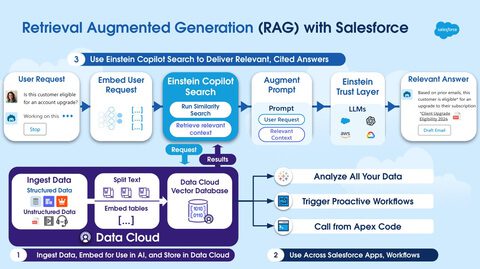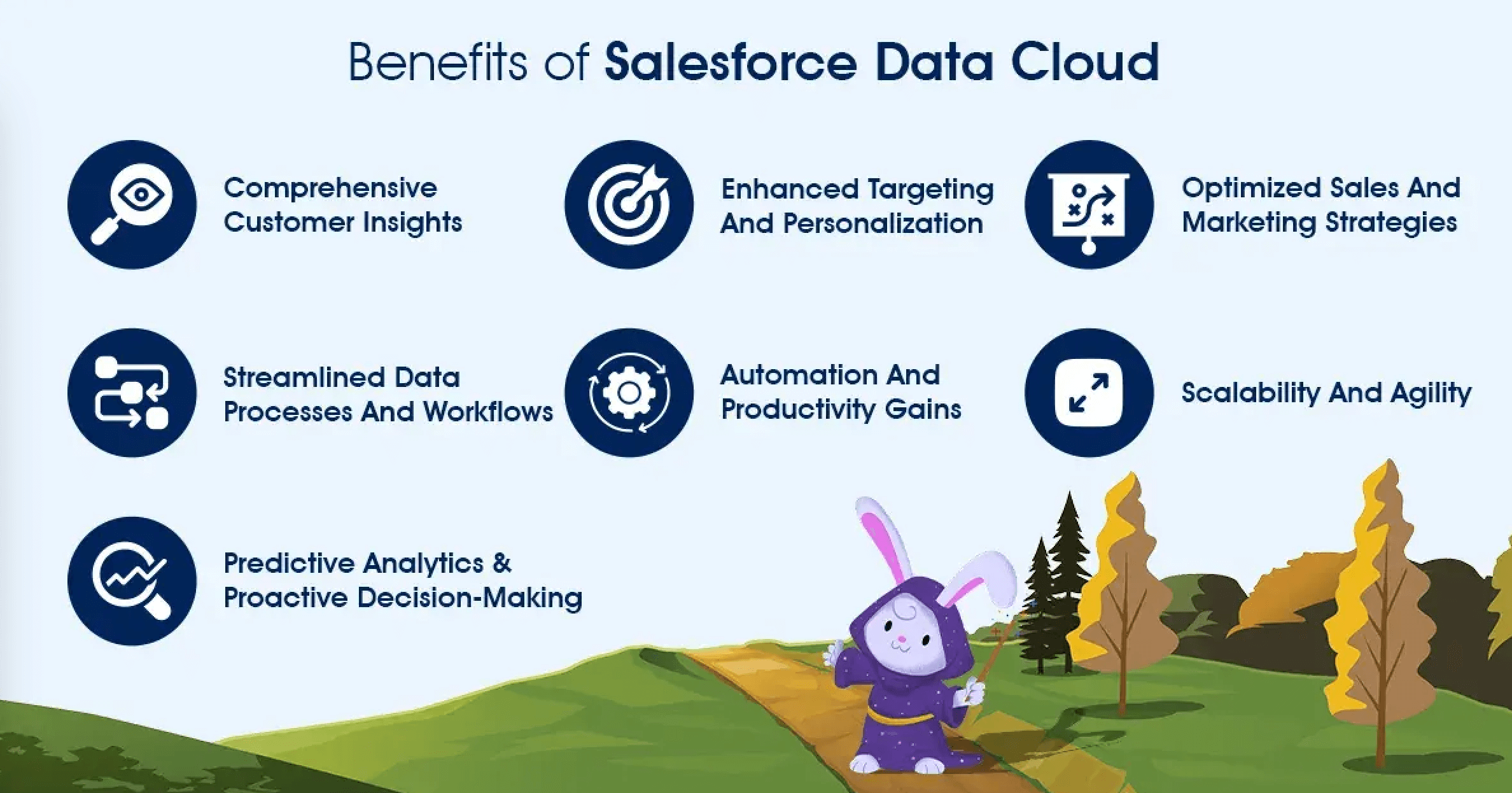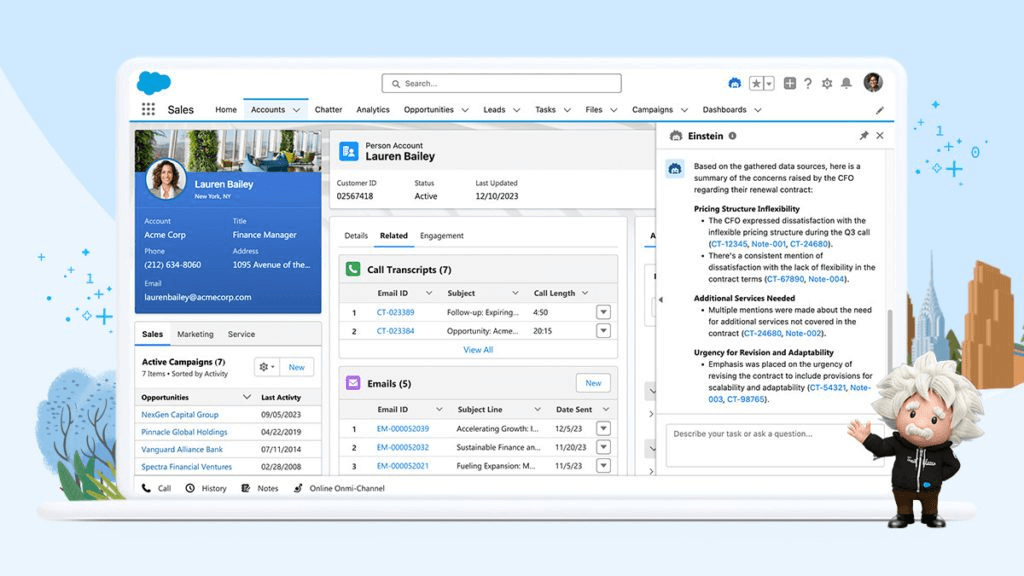Navigating the Future of AI and Data Management:
Insights into Salesforce’s Latest Innovations and Their Business Implications
In an era where data is king and artificial intelligence (AI) is revolutionizing business operations, staying ahead in the technological race is crucial. Salesforce’s recent announcement on December 14, 2023, marks a significant stride in this journey, introducing groundbreaking updates to its Einstein 1 Platform. As a leading Salesforce Partner, V2 Strategic Advisors recognizes the immense potential of these enhancements – the Data Cloud Vector Database and Einstein Copilot Search – hold for transforming customer engagement and business intelligence.
At V2, we believe in not just keeping pace with technological advancements but mastering them to empower our clients. This post delves into the intricacies of Salesforce’s latest updates, unveiling how they can revolutionize data handling and AI capabilities for businesses, especially those already leveraging large language models (LLMs). Whether you are a media giant or a growing enterprise, understanding these developments is key to unlocking new horizons of efficiency and innovation.
The core of this announcement is the introduction of the Data Cloud Vector Database and Einstein Copilot Search on the Einstein 1 Platform. The Vector Database is designed to integrate unstructured data with CRM data, enhancing AI efficiency, while the Einstein Copilot Search offers improved, AI-driven search capabilities. These advancements represent a substantial step in Salesforce’s ongoing innovation journey.

Understanding the Einstein 1 Platform
The Einstein 1 Platform is Salesforce’s AI-driven feature set, designed as a sophisticated blend of artificial intelligence and machine learning integrated into Salesforce’s core offerings. This platform serves as a powerhouse, enabling smarter and more intuitive interactions within the Salesforce environment.
For customers, the Einstein 1 Platform is a game-changer. It enhances customer relationship management by offering deeper insights through AI and data integration. This means more personalized customer experiences, streamlined processes, and a better understanding of customer needs and behaviors. The platform’s intelligence transforms data into actionable insights, driving efficiency and enabling businesses to make more informed decisions.
Let’s look at a few examples to ground how the Einstein 1 Platform could be used by a leading retail company, but with two different use cases in mind, one focused on adding marketing value to the team and one focused more on inventory management.
Personalized Marketing and Product Recommendations: Einstein 1 can analyze customer data, including past purchases, browsing history, and preferences, to create highly personalized marketing campaigns. For instance, a retail company could use it to send tailored email campaigns or in-app notifications featuring products that individual customers are most likely to be interested in. Furthermore, when customers visit the company’s website or use its app, Einstein 1 can provide real-time product recommendations that are specifically catered to each user’s unique tastes and needs. This level of personalization not only enhances the shopping experience for the customer but also increases the likelihood of purchase, thereby boosting sales for the retail company.
Streamlining Inventory Management and Demand Forecasting: Einstein 1’s AI capabilities can be utilized for sophisticated demand forecasting and inventory management. By analyzing trends from historical sales data, current market trends, and even social media sentiment, the platform can predict future product demand with high accuracy. This enables the retail company to optimize its inventory levels, ensuring that popular items are adequately stocked while reducing excess inventory that leads to markdowns or waste. Additionally, Einstein 1 can identify emerging trends, allowing the company to adjust its product offerings proactively to meet changing customer preferences. This not only reduces operational costs associated with overstocking or stockouts but also ensures that the company remains competitive and responsive to market dynamics.
The Role of Salesforce Data Cloud
Salesforce Data Cloud is a dynamic component of Salesforce’s ecosystem, designed to store, process, and manage data. It acts as a centralized hub for all forms of data, be it structured or unstructured, facilitating seamless data flow across Salesforce applications.
For businesses, the Salesforce Data Cloud is a vital tool. It offers enhanced data management and analytics capabilities, enabling companies to harness their data effectively. With this solution, businesses can gain deeper insights, make data-driven decisions, and optimize their customer engagement strategies.

The Significance of the Vector Database
The Vector database within Salesforce Data Cloud represents a leap in data processing. It’s designed to handle unstructured data, making it easier to integrate various data types and sources into a unified system. This improves the overall efficiency and effectiveness of data handling within the Salesforce ecosystem. Typically, processing unstructured data generally requires more computational power and energy compared to structured data. This is because unstructured data, like text, images, and videos, doesn’t follow a predefined format, making it more complex to process and analyze. Algorithms need to interpret, categorize, and analyze this data, which can be resource-intensive. However, advancements in technology and data processing methods are continually improving efficiency in handling unstructured data.
Most companies typically deal with a good mix of both structured and unstructured data. As you may know, structured data is well-organized and easily searchable (like information in databases), while unstructured data is more complex (like emails, social media posts, and documents), and the volume of unstructured data in business environments is growing rapidly, often making up a larger portion of a company’s data assets compared to structured data. This trend highlights the increasing importance of enhancements or solutions like this one, to help companies take action on the unstructured data they have.

The alternative would be that companies would have to invest additional resources into transforming unstructured data into structured data, which can be challenging due to the varied formats and lack of standardization in unstructured data. This process often involves employing advanced data processing techniques like natural language processing (NLP), image recognition, or machine learning algorithms. These methods identify and extract relevant information, categorize it, and then organize it into a structured format. The complexity of this task varies greatly depending on the type of unstructured data and the specific requirements for structuring it, but as mentioned above, with this new Vector Database, companies can now leverage unstructured data far more quickly and easily, saving teams budget and time.
Lastly, by enhancing data integration, the Vector database significantly boosts AI, analytics, and automation capabilities, particularly with large language models. It’s vital for businesses as it allows for deeper data insights and more informed decision-making.
Implications for Media Companies Using LLMs
For media companies using large language models (LLMs), this Vector Database offers a rich resource. It allows for better data organization and accessibility, essential for media content analysis and generation. Media companies can leverage this technology for advanced content recommendations, personalized user experiences, and efficient data-driven strategies in media production and management.
To anchor this concept in something tangible, let’s look at an example of how a media company, V2Media, could use these new Salesforce tools:
V2Media can leverage the Data Cloud Vector Database to integrate viewer data (watch history, ratings, feedback) with unstructured data (social media comments, reviews). This integration would allow for V2Media to better understand viewer preferences, leading to more personalized content recommendations and targeted marketing strategies. The Einstein Copilot Search can be used to enhance customer support, allowing quicker, more accurate responses to viewer inquiries. Overall, these tools enable V2Media to offer a more tailored, engaging viewer experience and improve operational efficiency.
“This advancement in Data Cloud, coupled with the power of LLMs, is a game-changer, fostering a data-driven ecosystem where AI, CRM, automation, Einstein Copilot, and analytics turn data into actionable intelligence and drive innovation.”
Strategic Implementation
Incorporating Salesforce’s new features into your business isn’t just about technological upgrade; it’s about strategic integration. Effective use of these tools requires thoughtful planning and a clear understanding of how they align with your business objectives.
If you are interested in taking advantage of these new tools, V2 Strategic Advisors is here to guide you through this process. Our expertise in Salesforce solutions means we can help tailor these new features to fit your unique business needs, ensuring you get the most out of your investment.
And in case you missed it, checkout this interesting video from Salesforce, where they explain how Data and AI are evolving media and entertainment. This video was produced to support the launch of these new tools for World Tour New York, just a few weeks ago.
Building Trust Starts With A Conversation.
If you’re ready to explore how these Salesforce advancements can propel your business forward, reach out to us at V2. We’re here to develop a personalized plan that aligns with your goals and helps navigate the exciting possibilities these new tools offer.
Let’s start this journey together and unlock the full potential of your business with Salesforce’s latest innovations.


